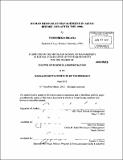Human resources management in Japan : before and after the 1990s
Author(s)
Okada, Tomohiko, M.B.A. Massachusetts Institute of Technology
DownloadFull printable version (11.36Mb)
Alternative title
HR management in Japan : before and after the 1990s
Other Contributors
Sloan School of Management.
Advisor
John Van Maanen.
Terms of use
Metadata
Show full item recordAbstract
In this thesis, I examine the impact on human resources (HR) caused by the lengthy recession in Japan. I discuss earlier systems of human resources management, then turn my focus to human resources since 1990. Japanese companies have a unique HR management system, with associated subsystems. I believe this system has contributed to fair and equal treatment of employees, while also allowing strong collaboration among employees, encouraging teamwork, and supporting high efficiency in operations. This system was once respected worldwide. At present, however, Japanese companies face many challenges such as declining domestic demand because of a shrinking population and an aging society, and cost pressures due to tough domestic and global competition. My research question is this: Have these challenges changed Japan's traditional HR management system? If so, what were these changes? In Chapter 1, I briefly trace the external environment surrounding HR management, and the characteristics of the traditional Japanese HR management system and subsystems. I find that a "Potential Abilities-Based Ranking System" has functioned as a core platform in the traditional HR system in Japan. In Chapter 2, I introduce the major characteristics of the Potential Abilities-Based Ranking System, developed by Kyu Kusuda. In Chapter 3, I look at changes in the external and internal environments surrounding today's HR management system. Assuming that the Potential Abilities- Based Ranking System is a core platform in Japanese HR management, the changes occurring in Japan may be influencing this core platform. I examine these influences to determine whether Japanese HR systems will be transformed or replaced by a global HR management system, similar to the American HR management system. In Chapter 4, I introduce a case study of HR management changes at Kirin Holdings Company (my employer). In Chapter 5, I discuss changes and challenges facing HR management in Japan.
Description
Thesis (M.B.A.)--Massachusetts Institute of Technology, Sloan School of Management, 2012. Cataloged from PDF version of thesis. Includes bibliographical references (p. 83-84).
Date issued
2012Department
Sloan School of ManagementPublisher
Massachusetts Institute of Technology
Keywords
Sloan School of Management.